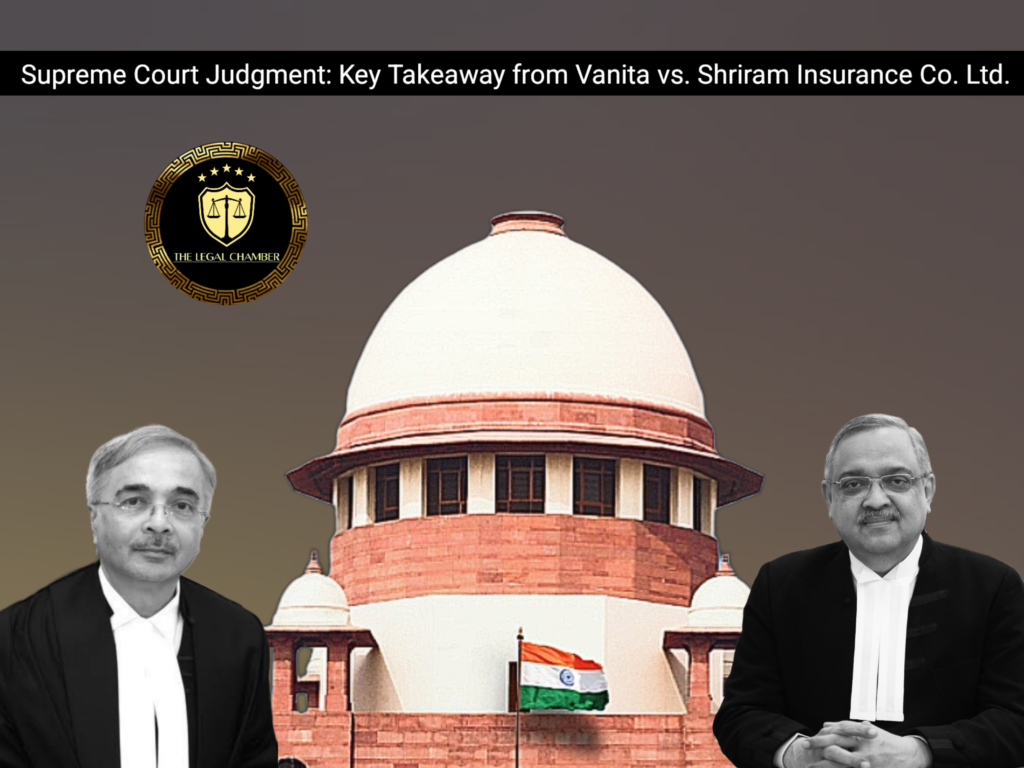The Supreme Court dismissed the civil appeal, thereby upholding the decision of the lower courts. The ruling signifies that the appellants’ legal challenge against the insurance company’s position was not tenable in law. The court found no merit to interfere, allowing the impugned judgment and the terms of the insurance policy to stand.
Facts Of The Case:
The case originated from a claim filed by Vanita and others, likely the legal heirs of a deceased, seeking compensation under a motor accident claim. The accident presumably involved a vehicle insured with M/s Shriram Insurance Company Ltd. The Motor Accidents Claims Tribunal (MACT) initially ruled in the case, and its decision was subsequently challenged in a High Court. It appears that the claimants’ appeal was unsuccessful in the High Court, leading them to file a Civil Appeal in the Supreme Court. The core legal dispute likely centered on the insurance company’s liability, potentially involving contentious issues such as the validity of the insurance policy, the terms of coverage, or the alleged breach of policy conditions by the insured. After considering the arguments, the Supreme Court found no legal error in the judgments of the lower courts and dismissed the claimants’ final appeal, upholding the decision that absolved the insurance company from the liability to pay the claimed compensation.
Procedural History:
The case originated with proceedings before the Motor Accidents Claims Tribunal (MACT). Dissatisfied with the Tribunal’s outcome, the claimants (Vanita & Ors.) filed an appeal before a High Court. The High Court dismissed their appeal, affirming the MACT’s decision. The claimants then exercised their final appellate remedy by filing a Civil Appeal before the Supreme Court. A bench of the Supreme Court, comprising Justices K. Vinod Chandran and N.V. Anjaria, heard the matter. Ultimately, the Supreme Court dismissed the civil appeal, thereby upholding the judgments of both the High Court and the MACT and bringing the legal proceedings to a conclusive end.
READ ALSO:Supreme Court : Wife as Attesting Witness Does Not Invalidate a Will
Court Observation:
Since the Supreme Court dismissed the appeal, its primary observation was that the appellants failed to demonstrate any legal infirmity, perversity, or error in the reasoning of the lower courts that would warrant judicial intervention. The court implicitly affirmed the findings of the Motor Accidents Claims Tribunal and the High Court, agreeing that the case presented by the claimants (Vanita & Ors.) was not tenable in law to fasten liability upon the insurance company. The dismissal signifies that the court found no merit in the arguments advanced to challenge the validity of the insurance policy, the terms of coverage, or the established facts that led to the denial of the claim.
Final Decision & Judgement:
The Supreme Court, in its final judgment, dismissed the civil appeal filed by Vanita & Ors. The court upheld the decisions of the lower courts, ruling in favor of M/s Shriram Insurance Company Ltd. This dismissal signifies that the appellants’ claim for compensation was ultimately rejected, and the insurance company is not liable to pay. The court found no merit in the appeal, and its decision is final, bringing the legal proceedings to a conclusive end.
Case Details:
Case Title: Vanita & Ors. vs. M/S Shriram Insurance Company Ltd. & Anr.
CITATION: Civil Appeal No. 6794 of 2025
Date of Judgement: September 4, 2025
Judges/Justice Name: Justice K. Vinod Chandran and Justice N.V. Anjaria
Download The Judgement Here
